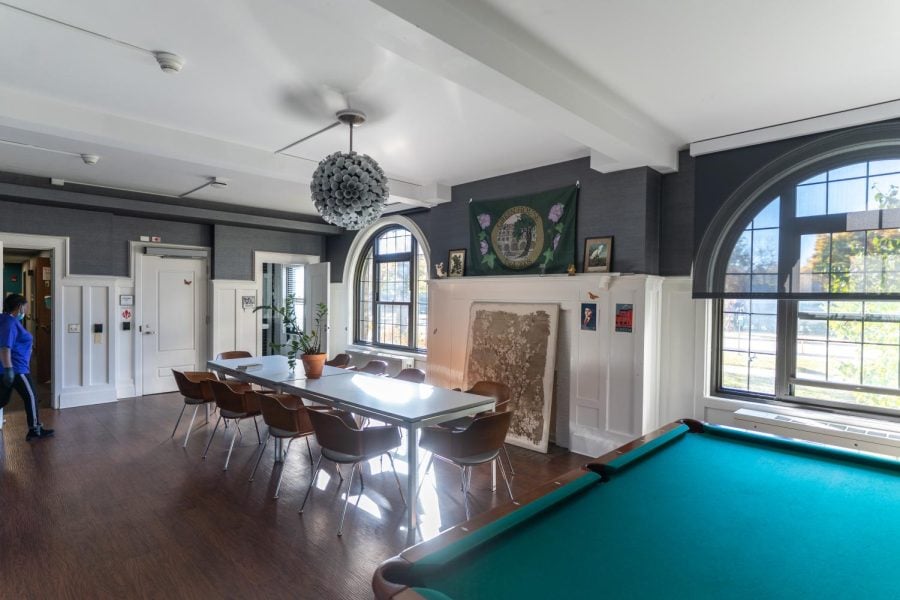Green House moves on from residential college petition, refocuses efforts toward other initiatives
Jonah Elkowitz/Daily Senior Staffer
A room in the Green House. The house’s residents have moved on from pushing to become a residential college and are now focusing on building community with residents and non-residents alike.
October 27, 2022
Last year, the Green House focused on petitioning for residential college status. But after those efforts proved unsuccessful, the environmentally conscious community is looking toward new ways to achieve its goals.
Increased non-resident involvement, energy-efficient laundry and a corn maze formal are just some of the initiatives the Green House is working on this year, as it moves on from its push to become a residential college.
Home to about 40 residents, the Green House is a special interest community for students committed to promoting environmentalism and combating climate change. Weinberg junior and Green House President Julian Zea said he saw transitioning from special interest housing to a residential college as a means to obtain more resources, visibility and publicity.
The endeavor came to a head at the end of this past Winter Quarter, Zea said. Residential Services was ultimately unconvinced by Green House’s arguments and informed the leadership that the process is uncharted territory, as no preexisting dorm has previously been converted to a residential college.
Weinberg junior and Green House Vice President Vlad Nevirkovets said the house realized it didn’t have to join the Residential College Board to achieve its goals.
“The new (executive) board, coming in by the end of the res college initiative, had more people and was much more energized,” Nevirkovets said.
He added that the board would have also had to increase membership costs for its residents to pay RCB dues, a downside it wanted to avoid. During Nevirkovets and Zea’s time walking around campus to collect petition signatures for its RCB push, Nevirkovets said, the Green House gained publicity and more non-residential members.
Unlike residential colleges, the Green House has no fee for its non-residential members. The house’s administrative committee has also been meeting with Residential Services to create a path for non-residential members to have Wildcard access to the Green House.
Zea emphasized the importance of free non-residential access to the Green House.
“Especially when it comes down to the topic of climate change, global warming and ecological devastation, these aren’t things that just affect a few people,” Zea said. “We should open up our doors to everyone that wants to be interested in these topics.”
Green House residents are currently working to create a centrifugal spin dryer that will lessen the impact of NU’s “energy-inefficient” dryers, Nevirkovets said.
The spin dryer would expel excess water from clothes to reduce the amount of time in a dryer, therefore reducing overall energy usage. Nevirkovets predicts the project will be complete by the end of the quarter.
“We don’t really build into any ultracapitalist companies or anything like that,” Zea said. “We simply make it ourselves and use it effectively.”
McCormick sophomore Jesus Benitez also is working on constructing a drying rack to avoid using dryers altogether, Nevirkovets said.
Green House activities don’t always focus on specific environmental actions. Weinberg junior and Green House Treasurer Preston Johnson said last year’s fall formal trip to a corn maze is an example.
“It just turned out to be a really fun bonding event. On our way back, we listened to an admittedly very annoying song on loop, but I was okay with it because we were all listening to it together,” Johnson said. “It’s called ‘Corn’ by Blake Shelton.”
Green House residents recently voted on this year’s fall formal, and a trip to the corn maze won once again. McCormick freshman Riana Tadonki said she is looking forward to it after hearing Johnson’s stories about last year’s formal.
The Green House is also hoping to work with Residential Services to find its own building to call home. It currently makes up part of the population of 2303 Sheridan Road, where it is appended to the Residential College of Cultural and Community Studies. Relocation is one more goal that the Green House is hoping to tackle in the near future.
“We hope to really not give up on this momentum,” Zea said. “Everyone in Green House is a little bit more inspired than before to step up and do something.”
Email: [email protected]
Related Stories:
— Students find community through residential colleges
— ‘Generations of Environmental Justice’ provides all-night climate education and builds community


